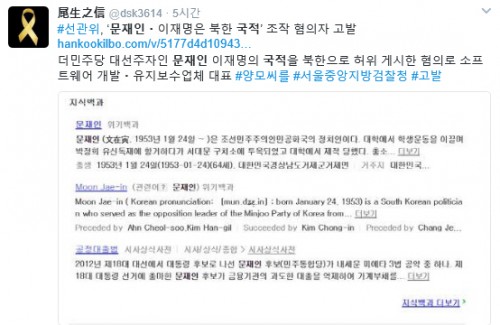By AsiaToday reporter Kim Eun-young - Fake news is rapidly becoming a global problem, and Asia is struggling with it, too.
 |
| Source: screenshot of the article on the Taiwan News |
The column asserted that in order to counter the ballistic missiles positioned in southern China aimed at Guam, Taiwan would be an ideal location to set up a THAAD system and that the U.S. might be eyeing Taiwan now that Japan and South Korea appear to be receiving the THAAD system. In other words, unconfirmed facts were quoted in the media and quickly became facts.
Fake news, which twists and distorts facts, also fuels social anxiety and disruption. Japan's Nikkei Asian Review recently reported that fake news has flooded in Malaysia on Facebook, Twitter, and other online sites over the past several months when Jakarta's governor campaign was in full swing. These fake stories asserted that the election bid of Chinese Christian incumbent Basuki Tjahaja Purnama is part of an anti-Islam conspiracy. They also caused public fears of a Chinese invasion and the revival of communism in Indonesia.
In Indonesia, rumors have also spread that 10 million Chinese workers had invaded the country to take locals' jobs away, and that the new rupiah notes, which are issued in December 2016, have the symbol of communism hidden on them. In response, the Ministry of Labor has strengthened investigations into factories suspected of employing smuggled Chinese workers while Indonesia's central bank considered filing a defamation charge against false claims, reported the newspaper.
Fake news is also being used as a tool to express hatred and groundless slander. The U.S. online media BuzzFeed News revealed that a Japanese website published a story back in January that a South Korean court judged a Korean man, who was accused of raping two Japanese girls aged 11 and 9 in 2000, innocent. The article spread widely on Facebook, getting more than 20,000 shares and comments. But it has been found to be false. The 25-year-old site owner, who asked for anonymity, told BuzzFeed News that fake articles about South Korea that angered or shocked Japanese audience were popular. "Articles that inspire hate get spread," he said.
UPI recently reported that as concerns about online fake news is going global, South Korea's national election commission is tackling the problem through online monitoring ahead of the presidential election. In January, the commission set up a team to tackle defamation and propaganda online.
 |
| Image: Twitter screenshot (@dsk3614) |
Most Read
-
1
-
2
-
3
-
4
-
5
-
6
-
7





















